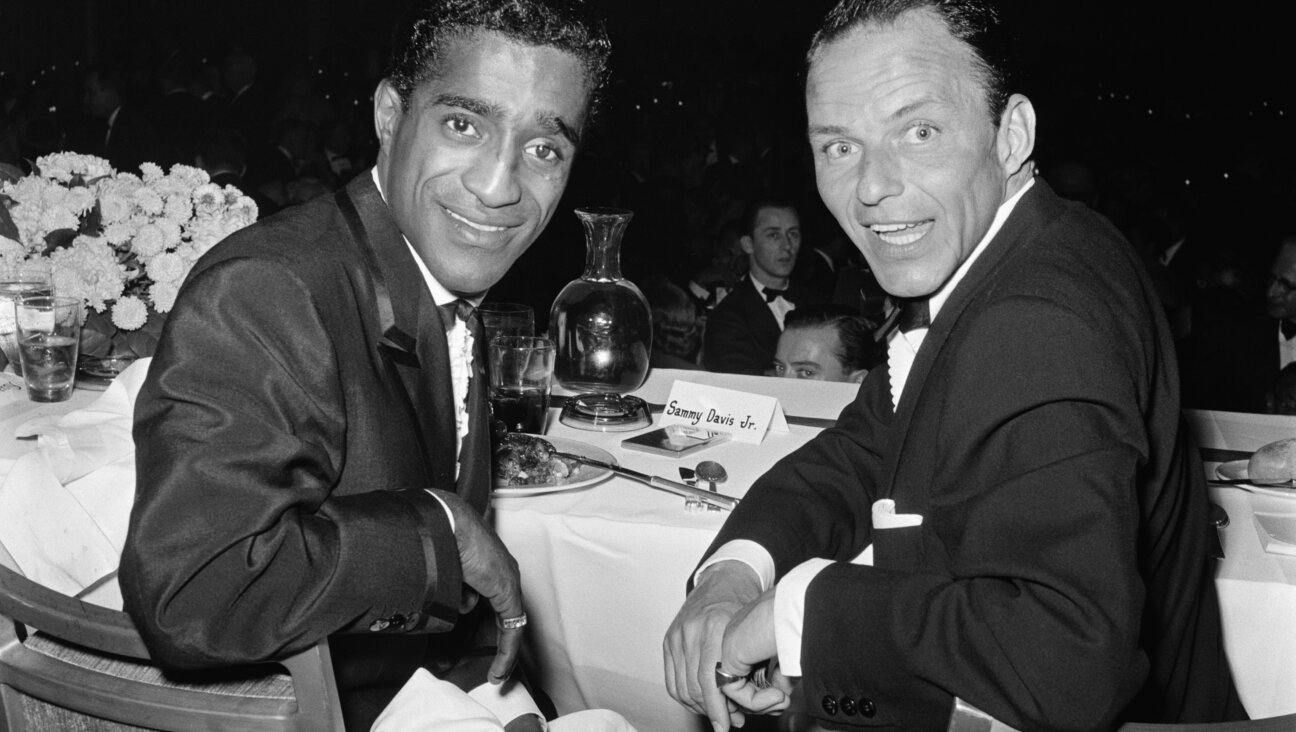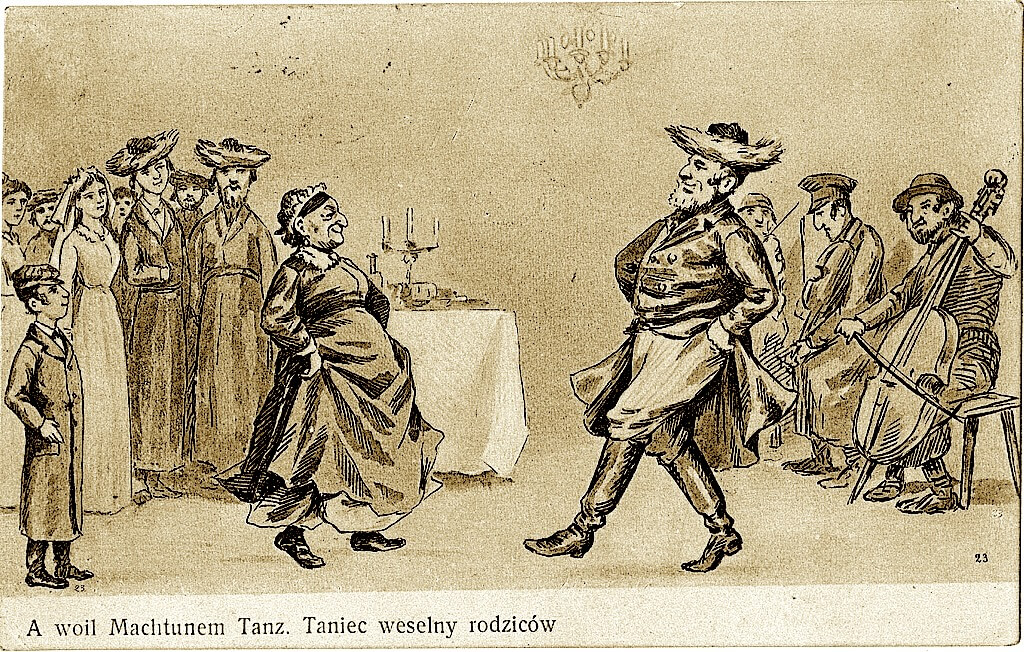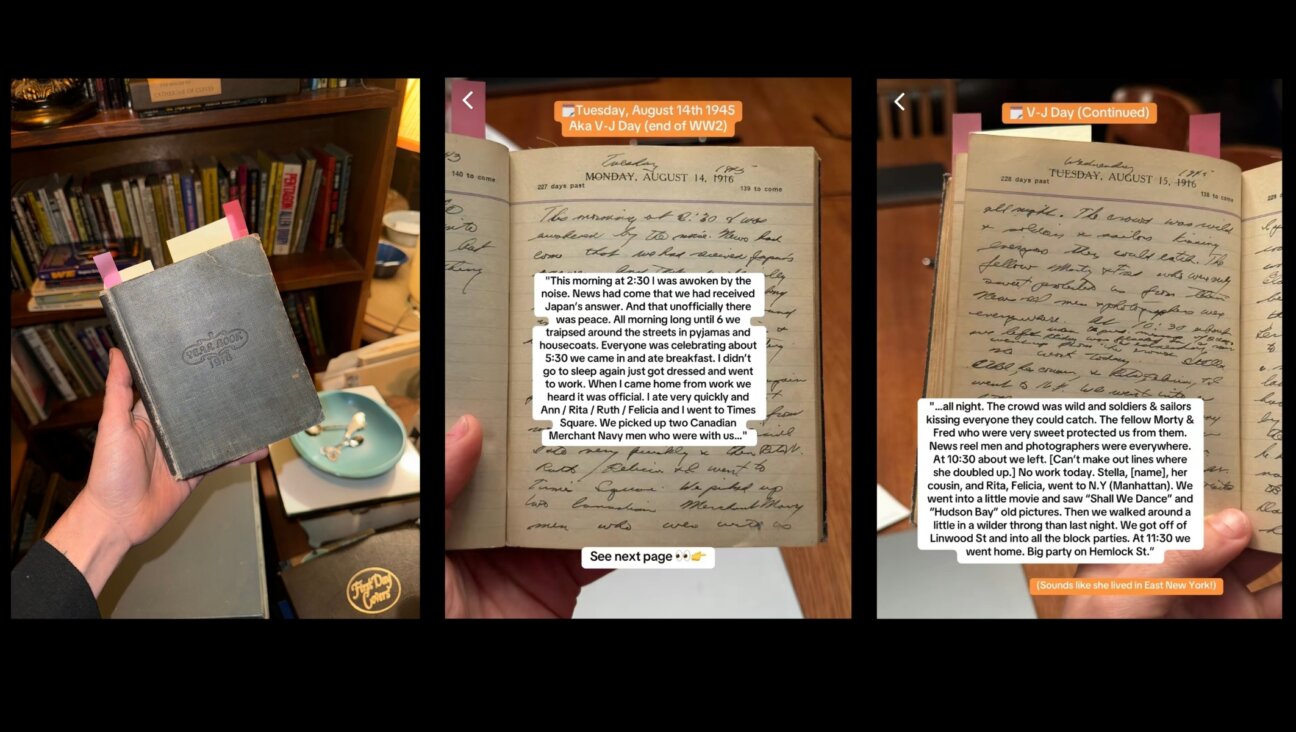Why Glaciers Are the Most Jewish Geological Formation — and Other Lessons From Alaska

Image by Isi Tenenbom
The glaciers in Alaska are a natural wonder to behold. I ‘ve been spending some days around them (via boats) and over them (via float planes). They remind me, funnily enough, of the Bible and its story of what the world looked like before God populated the earth with some Jews, some anti-Semites and everyone in between. But today I must take off from nature and attend to burning issues, such as American politics.
The GLACIER Conference (the Conference on Global Leadership in the Arctic: Cooperation, Innovation, Engagement and Resilience), hosted by the Foreign Ministry of the United States, is opening in a few minutes at Anchorage’s Dena’ina Civic and Convention Center. On today’s schedule are speeches by President Obama and Secretary of State John Kerry. The opening statement at this prestigious conference will, naturally, be delivered by the most important person in attendance: Lee Stephan, president and first chief of the Traditional Tribal Council of the Native Village of Eklutna.
Next to speak will be The Honorable Ethan Berkowitz, Anchorage’s Jewish mayor.
At 9:15 a.m., attendees are asked to be quiet.
They comply.
At 9:19, Kerry and the dignitaries enter.
The audience members rise.
The first chief speaks. He tells us that he is greeting us “in my language, which I never learned,” and proceeds to say a couple of words in the native language. The first chief quickly moves to speak in English again, and he thanks Obama for the honor of opening this conference.
Will the second speaker, Berkowitz, speak in Hebrew? No. Instead, he talks about Alaska’s diversity, and the fact that “we live the climate change every day.” Once upon a time, he says, “Sell air conditioners to Alaskans” was the punch line of a joke, but today it’s a reality.
Before concluding, he utters a word in the native language.
Many in America, I have learned in the past few months that I have been traveling here, like to show off their love of Native Americans.
I need a break. I get up from my seat, take three steps and a lady approaches me, asking what I need.
Toilet, I say.
Follow me, she says.
She takes me around the conference hall, from one end to the other, and then out all the way to the restroom. She shows me to the door of the men’s room and waits until I’m done. And then she escorts me back to my seat.
I am not sure if I should laugh at this little episode or not, but I find it quite disturbing that members of the media require a constant government escort.
Two seats away from me is an Alaskan journalist, a red-haired beauty who identifies herself as a “married gay,” and she wants out. She gets off her seat and walks over to the exit door.
Security stops her, telling her that she cannot leave the conference hall. Period.
Yes, nobody is allowed to leave this place. We are trapped inside. We have no choice but to listen to all the speaker, who, one after the other, prophesy the end of world as we know it, unless we perform deliberate acts to stop the climate change.
“I’m so grateful for such a display of interest by so many countries coming here today to be part of this discussion,” John Kerry says. Climate change is a challenge not to the next generation, but to this generation, he says. “The bottom line is that climate is not a distant threat for our children and their children to worry about. It is now. It is happening now… affecting millions of people today.”
For all Kerry’s big talk about the impressive attendance here, this conference is not really very well attended. Still, Kerry seems to enjoy the stage. He is grateful for the overwhelming interest the people here have in the subject, despite, as he says, the fact that such interest is not evident in this hall.
“Villages in Alaska are already being battered by storms, and some have had to move…. Houses and other buildings are literally collapsing into rubble. Already this is happening,” Kerry says.
Following his speech, sessions break into different rooms.
I go to one of them. Escorted, of course.
Most escorts are young Alaskan women or American military men in civilian clothes. They share with me their big love for Alaska and other intimate stories, but stop midstory at the exact moment we arrive at my next destination, be it a toilet or another session.
My newest destination for the moment is a session room where we hear about the dangers our world is facing, with emphasis put on Alaskan Natives whose villages are either being eroded or are about to erode.
After being escorted downstairs by yet another young woman, I meet some Alaskans.
“How many Native villagers are living in Alaska?” I ask an Alaskan woman.
“Do you mean off-the-road villages?”
“Yes, the Natives.”
“My WAG is about 125,000 people. But that’s just a WAG.”
“What’s WAG?”
“Wild Ass Guess.”
Got it. And how many of them are in danger of losing their homes?
This she doesn’t know.
Actually, no one I approach at this conference knows.
Down in the pressroom there are three big screens: The middle one is showing a session upstairs, on the left CNN is playing, on the right screen is MSNBC. No Fox News here.
I go outside where I see about 200 people standing, ready to welcome Obama in case his motorcade passes by. Among them are a woman and her grandchildren, Justin and Amelia. I ask the two kids if they love Obama and why.
“He is the president” Justin says.
Any other reason?
Yes. The president makes good laws, the kid says.
His grandmother is not impressed, but I tell her I’m interested in Justin’s and Amelia’s opinions and that it would be really great and cool if she lets them tell me about the good laws the president has made.
“The law that people have to stop at stop signs,” Justin says.
Grandma tries to get her grandchildren to give better responses.
Justin wants to please his grandmother, so he mentions another good law: “Boys and girls can marry.” A discussion follows between the two grandchildren, and then they tell me that two girls can marry each other and also two boys.
Grandma seems very happy.
Justin knows another law made by the president, and he shares it with me. The president, he says, is changing the name of Mount McKinley to Mount Denali.
A big smile appears on Grandma’s face.
I ask him why the president is changing the name to Denali. “Because he likes the name,” he says.
I bid this family farewell and go back to attend the conference.
As I make my way in, I find out that the day after tomorrow, Kerry will be in Philadelphia to deliver a major speech about the Iran Deal.
A busy man, this secretary.
Escorted by a 19-year-old Alaskan woman, I make my way up to the third floor, where the president is to give a speech in about an hour.
There I meet Dr. Matthew Sturm, and he has an exhibition of all kinds and sorts of ice, with a sign next to them: “Touch me.” He hopes, he tells me, that Obama will pass by him and touch the ice.
One ice sample, black in color, is 30,000 years old, he says.
I ask Sturm who is right: the conservatives who don’t believe in climate change or the liberals who do? He tells me that the proof is in front of my eyes: This 30,000-year-old piece of ice proves that climate change has been going on for many, many years. In addition, he chides, conservative business owners have climate change contingency plans; they talk big, but they hold tight to those plans.
Back in Montana I met a geologist millionaire, Mr. Carter, who makes his money by using his understanding of geology. At least this is the way he sees it. And he strongly disagrees with the climate change people.
Carter is worth millions upon millions; Sturm is having an exhibition. Who owns the truth?
I don’t know. I am not a geologist; I am a fat Jew. And for me, the most important part of Judaism is to question everything, to find the facts on my own and not trust what others tell me.
And the only fact I know at the moment is this: Obama is about to arrive.
By now the hall is packed. Where did all these people come from? Some came with the president, and others just showed up. Allah knows from which glacier they have descended.
On cue, Obama appears. “Thank you to the many Alaskans,” he says, “Alaska Natives and other indigenous peoples of the Arctic.”
“Our understanding of climate change advances each day,” he says. “Human activity is disrupting the climate, in many ways faster than we previously thought.”
There are two teleprompters next to him, one on the right and one on the left, which makes it easy for him to speak about climates, winds and storms as a man learned in the science of glaciers, icebergs, emissions, geology, chemistry, biology and a host of other sciences.
I have seen Obama before, when he was still a presidential candidate. He was a young, agile man then. Now, as he starts preparing for life after the White House, he seems to have grown quite older. He doesn’t move much, save for his head, which turns back and forth from right prompter to left. He seems tired.
Surprisingly, some in the American media — for example, NBC News — describe this speech as “a forceful address.” Perhaps those reporters have smoked a joint before coming here, a legal activity in this state.
In any case, what Obama lacks in stagecraft, at least today, he fills in with scary prophecies. “People will suffer. Economies will suffer. Entire nations will find themselves under severe, severe problems. More drought; more floods; rising sea levels; greater migration; more refugees; more scarcity; more conflict,” unless we take action to stop climate change.
He ends his remarks in a way almost no European leader ever will: “May God bless all of you, and your countries.”
To me, the most interesting element of this conference is the treatment of reporters here. An older military man, who says he has worked with more than one president, tells me that the Obama administration is very much about “control.” This administration, according to him, wants to control the media and keep it tight.
Wasn’t President George W. Bush the same?
“No way!”
President Clinton?
“You must be kidding! Not including President Obama, presidents are very lax with the media. You would never be escorted to the toilet! This administration is different. This administration wants to control everything, and it does.”
As the conference ends for the day and we all leave the building, a group of Christian singers awaits us on the other side of the street, urging us to believe in Jesus Christ. But I’ve had enough preaching for one day, and I head to a local bar. But instead of ordering a shot of brandy, I order coffee.
Alaska, let me tell you, is a wonderful place. If you believe in the Bible and in creationism, you will find this place to be the biggest proof of God’s genius imagination. If you are a pro-environment fanatic, you will find this place to be the biggest proof that Darwin got it right and the climate is warming up. No matter who you are, what kind of beliefs you have, Alaska will gladly serve as your witness. And it is here where you realize that the fight about climate change is a fight between two camps of fanatic believers who understand geology as much as I understand Chinese anthropology.
As for me, it’s time to go back to the real glaciers — the most Jewish of places in all the United States.
Tuvia Tenenbom’s most recent book is “Catch the Jew” (Gefen, 2015).
A message from our Publisher & CEO Rachel Fishman Feddersen

I hope you appreciated this article. Before you go, I’d like to ask you to please support the Forward’s award-winning, nonprofit journalism during this critical time.
We’ve set a goal to raise $260,000 by December 31. That’s an ambitious goal, but one that will give us the resources we need to invest in the high quality news, opinion, analysis and cultural coverage that isn’t available anywhere else.
If you feel inspired to make an impact, now is the time to give something back. Join us as a member at your most generous level.
— Rachel Fishman Feddersen, Publisher and CEO






















